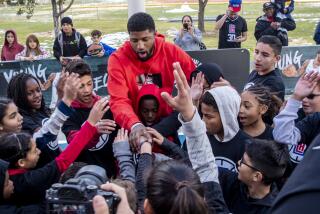Cowens: Former Celtic Center Still an Individualist
- Share via
WORCESTER, Mass. — Dave Cowens, a rugged individualist who says a seven-hour drive to work “isn’t a big deal,” finds traveling on basketball’s back roads a normal way to go.
But the coach of the Bay State Bombardiers of the Continental Basketball Assn., who once starred for the world champion Boston Celtics of the National Basketball Assn., speaks from a unique perspective.
For Cowens, the unpredictable has been the norm:
--He was an undersized center whose intense, physical style helped him become the NBA’s Rookie of the Year and Most Valuable Player.
--He took a two-month leave of absence from the Celtics early in the 1976-77 season before going back, saying, “My enthusiasm has returned.”
--For one night during his playing career, he and a friend picked up passengers in a cab to “have a good time.”
--After retiring from the Celtics, he became athletic director at Regis, a women’s college west of Boston. A subsequent comeback attempt with the Milwaukee Bucks was cut short by injury.
“I don’t think any of the stuff I’ve done has been strange,” Cowens said. “I’m just living my life, that’s all.”
Now he’s living it far from the roaring crowds in big arenas from Boston to Los Angeles. He toils in smaller gyms from Toronto to Puerto Rico and from Worcester to Wyoming.
To Cowens, it’s all logical.
He sees his first-year job with the minor-league Bombardiers as a possible boost toward a college or NBA coaching position, just as he hopes his players can use it as a steppingstone. He describes it as a challenge with “a fairly good salary” in a field in which he’s interested.
“I don’t see why people think I do things that are strange,” he said. “I have a wife and two kids. I lead a fairly normal existence.”
With a much smaller budget and staff than he had as player-coach of the Celtics in 1978-79, he has to do more. When the Bombardiers play in Lancaster, Pa., he drives his own van, loaded with luggage and “a couple of guys,” while the rest of the team makes the seven-hour journey in the club’s vehicle.
“That’s overdone,” Cowens said of the idea that the CBA life style is difficult. “If you have to do a 30-hour trip and get out of the van and play, I’d say, ‘Yeah, it’s a hardship.’ Seven hours isn’t a big deal. We’ve never had to do a seven-hour trip and play that night.”
There are things about the CBA Cowens does not like.
“It’s more involved with administrative things, the money situation, the freedom that I have as a coach,” he said.
He also criticized the system by which teams obtain players. If a player went to a school whose territorial rights are assigned to a CBA team, that team would have first crack at him when he is cut by an NBA club. Each CBA club also can get players from two NBA teams with which it is affiliated.
If a player assigned to one of Bay State’s NBA affiliates is cut and signs with another NBA team, his rights are transferred to the CBA club affiliated with his new team.
And, Cowens said, players simply might not want to play in the CBA.
“I sit around when training camp opens (and) I say, ‘Well, I wonder who’s coming to camp,’ ” he said.
He proposed a system by which each of the 14 CBA teams would have one NBA affiliate, which could be used for public relations purposes. Rights to NBA players not on an affiliated club would be assigned in a publicized draft.
“It makes it more legitimate and coaches who do their work get the better players,” Cowens said. “That makes sense.”
Jay Ramsdell, the CBA’s vice president for operations, said Cowens’ idea “was discussed at our last owners’ meeting and was not approved. The cons outweighed the pros.”
Cowens’ season began with pros. Bay State won its first three games. It ending with cons--and with the Bombardiers in sixth place in the Eastern Division, out of the playoffs.
He said he has no regrets about taking the job. He’ll decide after the season whether he’ll return, seek another coaching position or do something else.
Cowens said he wanted to “experiment with that profession, see if that’s (how I) want to spend all my hours.” He’s found “just being involved with the game” to be the most enjoyable part of his work.
More to Read
Go beyond the scoreboard
Get the latest on L.A.'s teams in the daily Sports Report newsletter.
You may occasionally receive promotional content from the Los Angeles Times.








